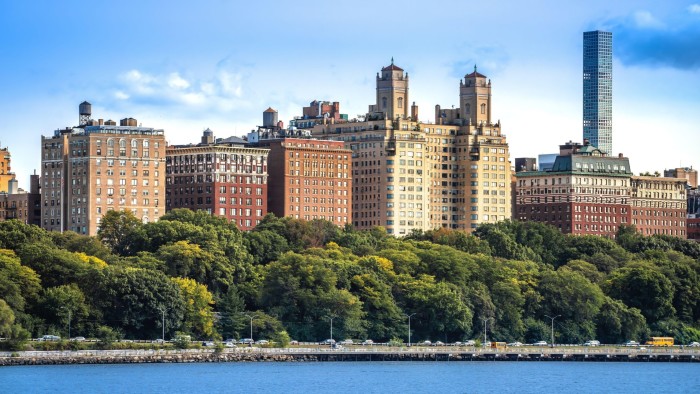Unlock the Editor’s Digest for free
Roula Khalaf, Editor of the FT, selects her favourite stories in this weekly newsletter.
After an unexpected twist in New York City’s recent Democratic mayoral primary, questions are swirling about what the city might look like under Democratic candidate Zohran Mamdani if he wins the election in November. As a realtor, the question I’m hearing most from buyers and sellers is: what will this mean for New York’s prime real estate market?
A socialist mayor potentially taking office makes for an easy knee-jerk narrative in certain circles: he’ll drive out businesses, tank the value of homes at the top end of the market; high-net-worth individuals will flee, the market will crater, and the city’s global standing will deteriorate. But when it comes to NYC real estate, fears like these regularly appear for one reason or another — and tend to be driven more by sentiment than substance.
To embrace the idea that a political newcomer could immediately enact sweeping changes in a city as complex and bureaucratically entrenched as New York overlooks how difficult meaningful reform can be. Take, for instance, the proposal for a “millionaires’ tax” floated in 2017 during a mayoral race. It generated similar headlines and narratives but ultimately stalled. Campaigning for ambitious policies is one thing; turning them into law is another. The idea that Mamdani could unilaterally upend the real estate market overnight reflects political anxieties more than the practical realities.
There are understandable questions about Mamdani’s policies, his experience, and how feasible some of his proposals — including raising property and corporate taxes — may prove in practice. But while a mayor can influence the city’s budget and policy direction, they cannot impose new taxes unilaterally; that authority rests with the state legislature.
Still, buyers and sellers are right to be paying close attention. The key is to distinguish between informed caution and premature conclusions. The more carefully buyers and sellers evaluate what a new administration could realistically implement, the more effectively they can prepare.
We’ve seen this kind of doomsaying before. Fear is a well-worn cycle in New York. In 2020, headlines predicted the city’s permanent decline, in countless iterations of the same message: “New York is dead”. But just a few years later, the picture looks very different. Restaurants are packed, home inventory is tight and the city feels as alive as ever.
During Covid-19, buyers and sellers were faced with a simple decision: believe in New York’s long-term resilience and ride it out, or quit. Walk away from a contract deposit. Sell at a loss. I had many top-of-the-market buyers who considered walking away from deposits on signed deals in prime neighbourhoods such as Tribeca and the West Village. We advised them to hold steady, and they did. Today, those same properties are worth 25 per cent more.
Many who left, meanwhile, are now returning from their so-called “permanent” moves to South Florida.
More broadly, to assume that a potential tax adjustment would categorically deter wealthy individuals also oversimplifies how many assess value. Real estate in New York has never been easy, convenient or cheap. Buyers face bidding wars and title insurance as well as high attorney fees, complex financing approvals and — for those purchasing in co-ops — rigorous board interviews, financial scrutiny and, in some cases, the inability to finance altogether. Property taxes are layered with a mansion tax, mortgage recording tax and overlapping state and city income taxes. Simply put, it has always been easier to buy a home in the suburbs than within NYC’s roughly 300 square miles.
The city has always come with trade-offs: noise, traffic, bureaucracy and, yes, taxes. But it’s also a city that delivers. Little compares to a prewar Fifth Avenue co-op overlooking Central Park or a landmark SoHo loft with original cast-iron columns and 14ft ceilings — all within walking distance of some of the best dining, shopping and entertainment in the world.
As for the state of the market right now, there doesn’t appear to be significant jitters. Between March and June 2025, while Mamdani was actively campaigning, our team represented clients in more than $165mn worth of New York City real estate transactions, including the most expensive sale ever recorded in Downtown Manhattan. The Manhattan market as a whole finished June with contracts signed on 153 properties worth more than $4mn, according to the Olshan Luxury Market Report — marking the third-best June since 2006.
The coming months will tell if the primary has had any real impact. But otherwise, as is typical every summer, July is expected to be quieter, with buyers stepping back until after Labor Day. That seasonal dip often presents a compelling opportunity for buyers who stay local.
As for reports of deals falling through, real estate transactions collapse year-round, and for all kinds of reasons — mismatched expectations, bad timing, shifting buyer priorities or sellers holding out for a higher number. That’s New York: high stakes, high reward. Suggesting that a mayoral race is the sole culprit behind anecdotal failed deals is to conflate narrative with data.
Zeve Salman is the co-founder of Elevated Advisement, a real estate team based in New York City and affiliated with Compass
Find out about our latest stories first — follow @ft_houseandhome on Instagram
